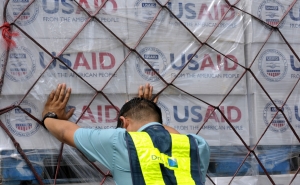Women’s Leadership in Global Health: Going Beyond Barriers and Shining a Light on Impact
New Grant to Evaluate Positive Impacts of Women Leaders

Women’s leadership in the public health space—and lack thereof—has been a growing topic of interest in global health. Women comprise nearly 70% of the health care workforce but only hold approximately 25% of leadership roles. Much of the conversation has focused on barriers women face in reaching leadership positions, including a lack of mentorship opportunities, gender biases within organizations, and harassment. Gender and health experts at the Johns Hopkins Bloomberg School of Public Health are aiming to pivot the conversation and raise awareness of the positive impact that women leaders have in the global health space.
Anna Kalbarczyk, DrPH ’20, MPH, assistant scientist and Rosemary Morgan, PhD, MSc, associate research professor in the Department of International Health at the Bloomberg School, received a combined grant of $440,000 from the Global Financing Facility and Gavi, the Vaccine Alliance, that will enable them to take a critical look at the organizational factors that enable women leaders to succeed in their positions and have an impact. They will examine how women are positively impacting global health policies, strengthening health facilities, and reducing health inequities through leadership positions.
“Health leadership and policy decision-making affect women. There is a disparity between the policies that are being made for them and are having an impact on them, and the level of input they have in the decision-making process,” says Kalbarczyk. Women are not only directly affected by policies centered around reproductive, maternal, newborn, and child health, but are also affected by health policies in less obvious ways, for example, in areas such as immunization, where women are often the ones responsible for taking children to be vaccinated and can face barriers to obtaining vaccinations for their children (and are often targeted for vaccine misinformation), and HIV, where adolescent girls are one of the groups with the highest rates of infection.
“It’s about what issues are being prioritized, what is seen as important, and where resources are going. Having more diversity at the table, including women, will allow leaders and policymakers to more effectively draw attention to and address issues that are often not given proper attention,” says Morgan.
Through the grant, Kalbarczyk and Morgan will generate evidence for investing in women’s leadership in global health and identify key concepts, research gaps, and sources of evidence to inform practice and policymaking. Key objectives of the grant include:
- Identifying evidence to support investment in women’s leadership and explore the impact of women’s leadership in reproductive, maternal, newborn, child, and adolescent health and nutrition (RMNCAH-N) and immunization fields and more broadly, at the global, national, sub-national, and community levels.
- Exploring the impact of women’s leadership in supporting and encouraging organizational change and improving health outcomes.
- Identifying organizational and other factors that support women leaders in having an impact.
By going beyond barriers to women’s leadership, this grant will generate evidence for a deeper understanding of the impact of women leaders. The research has the potential to impact organizational and systems change by informing policies and practices, empowering women leaders, supporting women leaders' capacity building and development opportunities, filling research gaps, and contributing to gender equity in global health.
Morgan is the lead editor on the book Women Leaders in Global Health: Power and Transformation, and Kalbarczyk leads the Emerging Women Leaders in Global Health (EDGE) network, led by the Johns Hopkins Center for Global Health, which provides a community, networking events, conferences and programs designed to nurture and support emerging women leaders and male allies in global health.
Kalbarczyk and Morgan will host an event to launch a new study on the impact of women’s leadership in global health on March 21, 2024 from 11 a.m. to 12 p.m. EDT. Interested attendees can register for the webinar.





